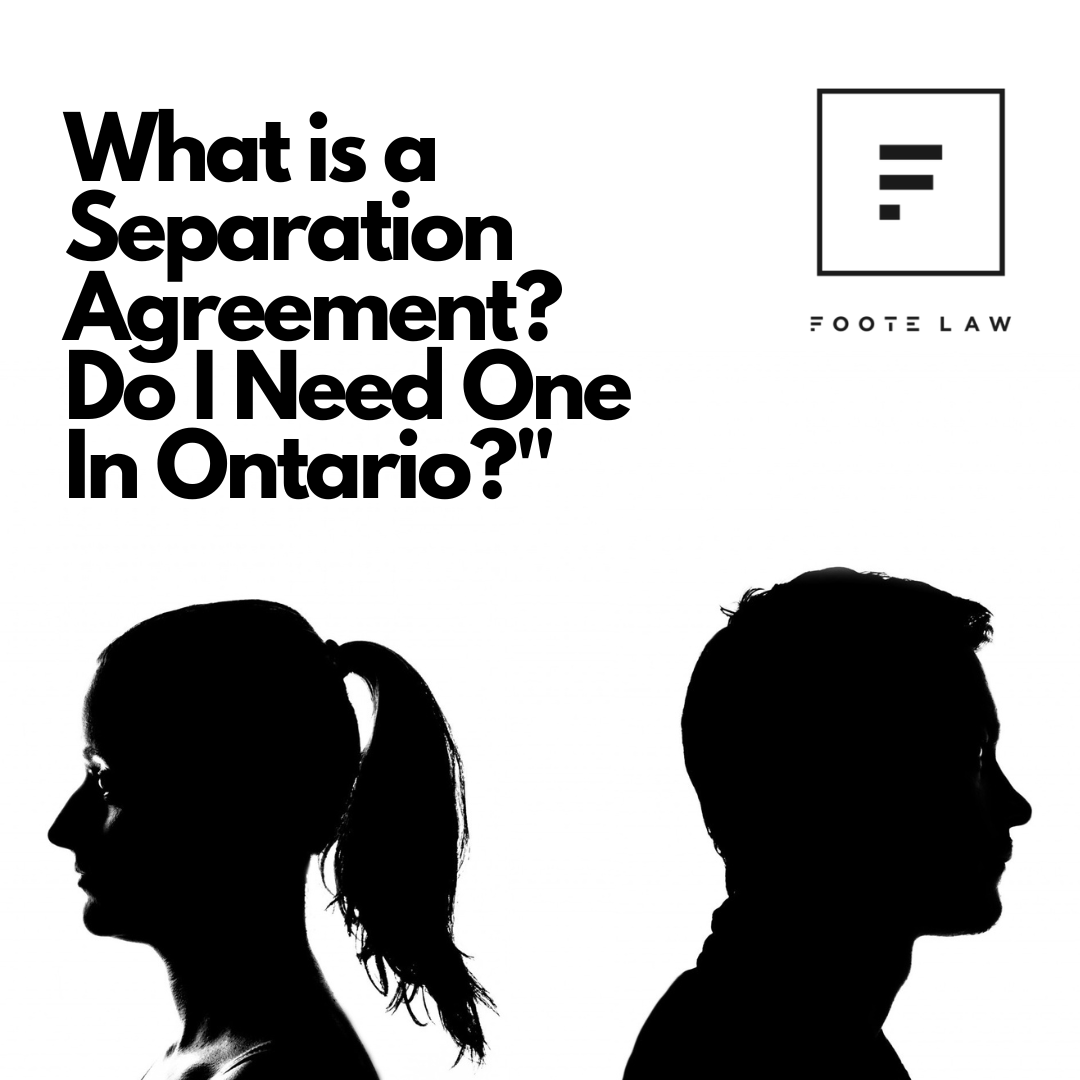What is a Separation Agreement?

If you are considering terminating your relationship with your spouse and possibly divorcing, it is important to understand what constitutes being separated, the difference between separation and divorce, and how a Separation Agreement can help you successfully negotiate the next step in your life. So what is a Separation Agreement?
Understanding Separation
When a couple – whether legally married or common-law, decides to live separately and apart, they are considered to be separated. This applies even if they continue to live together in the same house. It is not always possible for one party to move out right away. Therefore, you can still live together under the same roof and be considered “separate and apart” if you no longer have an intimate relationship, you are not involved in each other’s lives, and you do not share chores or household duties.
Separation versus Divorce
In Ontario, a separation is when two people begin living apart from each other, while divorce is when the marriage is terminated by way of a Court Order. Technically, you can stay separated indefinitely without ever filing for divorce. Divorce does not automatically occur after separation. Rather, a divorce must be undertaken legally by one or both parties. Many couples will live separated for years until one person wants to remarry, and then both parties will undertake official divorce proceedings.
However, a separation is often a precursor to a divorce. Many people, after separating, may want to begin divorce proceedings as soon as possible.
One very important fact to note is that in Ontario, you cannot obtain a Divorce Order until you and your spouse have been separated for a minimum of one year unless one spouse is filing for divorce on the grounds of cruelty or adultery. This is why in the eyes of the Court, it is crucial to establish the date that your separation began, whether you live together or one of the parties moves out.
You can establish this date of separation by keeping records of emails, letters, or text messages about separating. Details as to when you began to live separately, such as sleeping in separate rooms, separating finances, travelling alone, and so on, are also important to establish the date of separation. Another way to establish this date is to sign a Separation Agreement by both parties.
Why do you need a Separation Agreement?
In Ontario, a Separation Agreement is not required by Canadian law when two parties decide to separate. However, it allows both parties to make decisions in writing when you separate so that both parties’ interests are protected.
If you and your spouse can amicably agree to the separation, then you may not need a Separation Agreement, or you may create your own Separation Agreement and have it reviewed by a family law lawyer.
However, if there is any conflict, or if one party refuses to agree to the terms of separation, you may need to retain a lawyer to draft the Separation Agreement that protects your interests. A Separation Agreement is highly recommended if you have children and intend to file for divorce.
What is covered in a Separation Agreement?
A Separation Agreement will set out the terms and conditions for issues, such as:
- Parenting and decision-making of children
- Residency of children and parenting time
- Child support and extraordinary expenses for children
- Medical/dental coverage
- Spousal support
- Possession of the matrimonial home
- Equalization of net family property (assets/debts)
- Life insurance
- Sharing of any pension plans
- Divorce
When it comes to property, a Separation Agreement is not legally required to sell the matrimonial home if both parties agree. However, you will need one to enter into a new mortgage.
How is a Separation Agreement enforced?
In Ontario, a Separation Agreement is a domestic contract between two parties; therefore, it is legally binding and can be enforced under Ontario’s Contract Law. Child and spousal support provisions can be enforced through the Family Responsibility Office, which has the authority to collect these payments at source in accordance with the agreement’s provisions.
Separation Agreements in Ontario can be legally challenged in court in cases where one spouse was pressured into signing, did not provide accurate information, or did not otherwise disclose information. In such a scenario, the Court may set aside or change the terms of the agreement and enforce new terms.
Why work with a professional?
When children are involved, and/or there are conflicts between the two parties, consulting an experienced family law lawyer like Foote Law to draft a Separation Agreement could avoid lengthy and expensive court proceedings.
Separation or divorce is typically very difficult and stressful for everyone, with many uncertainties about the future. A Separation Agreement that sets out the specifics can help protect your interests, ensure fair terms and conditions, and provide peace of mind.
Foote Law – Family Lawyers in Orangeville
If you are in the process of separating from your spouse and/or intend to file for divorce, contact the experienced family law lawyers at Foote Law. We offer independent legal advice and will ensure you understand the consequences of signing (or not signing) a Separation Agreement. We would happily answer your questions and work with you for a beneficial outcome.
You can also read more about our separation agreement process at Foote Law in Orangeville, by clicking the link below:
Foote Law – Separation Agreements Page



Recent Comments